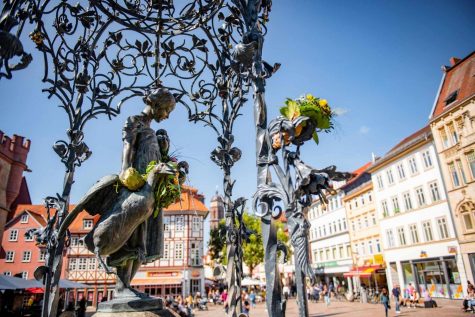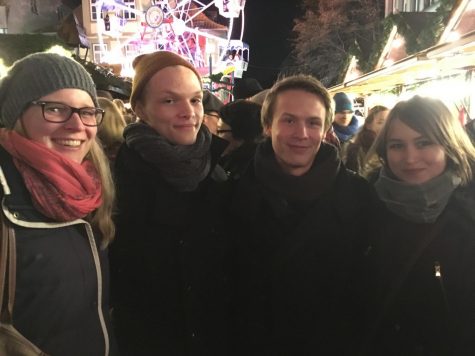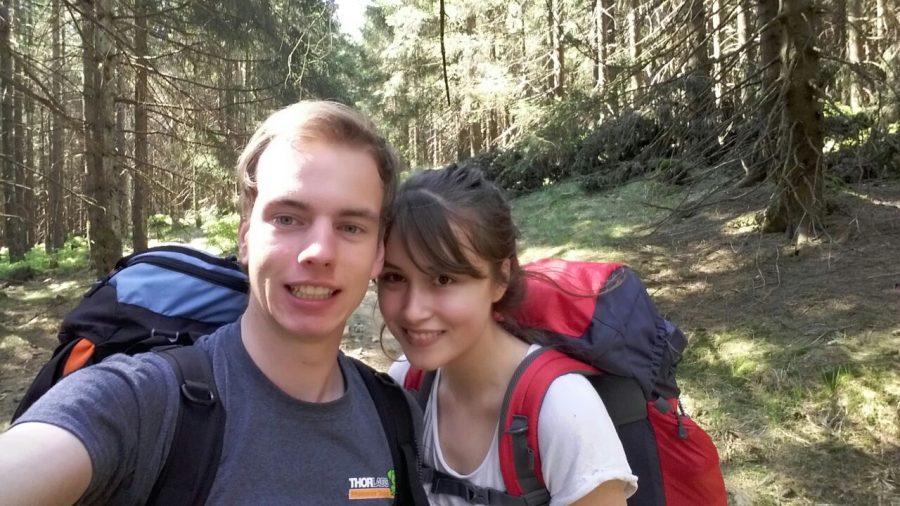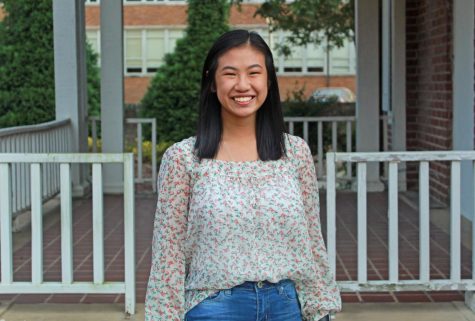German Student Teacher Laura Justus Learns from MSMS
Justus (right) and a friend spend time outdoors.
January 21, 2019

“Gänseliesel” is a famous fountain that stands in Göttingen and carries a tradition for Georg-August-University PhD graduates to kiss the girl’s head.
Thousands of miles from home for the first time, 22-year-old Laura Justus arrived at MSMS in late September with hopes of gaining teaching experience abroad and showing the German students how wonderful the language and culture is.
Justus, from Göttingen, a small town located in central Germany, knew from a young age that she wanted to become a teacher, but she didn’t quite know which subjects she would be pursuing.
“At that time most adults around me were more like, ‘Yeah, sure, whatever. You’ll change your opinion anyway,’ but I never really did,” Justus said. “For a long time, I thought I would choose English and history, but then I noticed that studying history would mean sitting in a dusty library, reading old sources for ages.”
During her elementary years, Justus’s family moved to a more rural village, Duderstadt. While this initially meant that she would leave everything she knew at the time behind, this move would eventually offer her a more meaningful childhood with a strong and supportive community. This is also the same time when she would start learning English.
In Germany, elementary school, known as “Grundshule,” lasts four years with the traditional first through third grade. Afterwards, students are divided and moved to one of three different types of compulsory secondary school. “Hauptschule” prepares them for jobs such as skilled trade, and “Realschule” sets them up for office work. Both of these schools end after 10th grade. “Gymnasium” produces students that will go on to university, and it lasts until 13th grade. When these students graduate, they earn a degree called “Abitur,” allowing them to apply to university given they maintain good grades their final two years. It is typically not up to the students to decide which school they attend; either their parents or their elementary teachers choose depending on the state.
Justus attended a “Gymnasium” and went on to university. She graduated from Eischsfeld Gymnasium Duderstadt in 2014 and received her bachelor’s degree from Georg-August-University in math, chemistry and profile teaching in 2017. She has about 2.5 years of school left until she officially becomes a teacher.

Georg-August-University is a public research university located in Göttingen, Germany.
Justus never planned to go abroad until she came across the government-funded program, “Teaching German in U.S. Schools,” and decided to apply three days before the deadline. She is one of the 15 teachers and student teachers that were accepted and assigned to certain schools for an 8-month internship in which they help teach German and classes in their respective areas.
“If someone had told me I would be going abroad with [my career] a year ago, I wouldn’t have believed him. While all my friends went abroad after graduation, I decided to better stay at home because living in another country seemed to be kind of scary,” Justus said. “Now that I am here, I am really happy that I took that step. It’s a great experience.”
“Laura is a very accomplished, intelligent woman. I was impressed from my first meeting with her at her ability to assess what is going on around her and adapt, ” said Lori Pierce, MSMS German instructor and Justus’s assigned mentor. “She has shown an incredible willingness to adjust her expectations to the situation here at MSMS. Neither she or I really knew exactly how this would work here.”

Justus (far right) and her friends enjoy an evening out.
“She gives a different perspective and brings a culture other than that of the American culture,” said junior Audrey Wohlscheid. “She is very smart, and since she is actually German and has grown up speaking German, she can adequately teach the language and better explain it to me in the classroom.”
Upon her arrival, Pierce was always available for Justus to seek help or comfort from. Pierce helped her with getting her visa, finding housing and adapting to the new country and language.
“I spent the first three months basically following her wherever she went,” Justus said.
Back home, Justus used to go horseback riding and dancing, but here in Columbus, she spends her free time outside the classroom catching up on the books that she’s been wanting to read in the last couple years. On most mornings, she can be found at Stark going for a swim.
After spending four months here, she has learned a great deal about MSMS and the American school system. Pierce, as well as some math and chemistry teachers, have allowed her to not only sit in, but also teach some lessons. She hopes to take a collection of new impressions and ideas that could potentially help offer her future students a better education.
“I learned a lot of stuff, like what the ACT is and why everyone hates it. I’ve also been watching a lot of great, experienced teachers, so I got the chance to see different ways of teaching and some approaches to topics I’d never seen before,” Justus said. “It’s good to see that there are many different ways of being a good teacher and that it’s not necessary to stick to the one way they teach us at the University.”
“She came to Mississippi having never been to the U.S. before and has very quickly learned how to we do things differently and is even beginning to do some of those things differently herself,” Pierce added. “Laura obviously has a love for teaching, and she relates to students, which I think are two of the most important attributes of a teacher. At the same, she is sharing valuable details about German and Germany with my students. She cooked a huge number of cookies at the end of last semester and shared them with everyone at MSMS.”
Apart from the academic side of MSMS, she has observed a lot about the culture of MSMS and the types of people that are a part of this big family.
“I see that the students really want to learn and to use all the opportunities MSMS offers them to achieve a good future. I think none of you are here here just because school is mandatory; you all really want to be here,” Justus noted. “It’s the same with the teachers. All the teachers are so motivated and show so much commitment to what they are doing. I didn’t experience anything like MSMS during my last internship in Germany. I, rather, have the impression that the teachers are really passionate both about the subject they teach and about teaching itself.”
Justus has enjoyed every moment in the States thus far and looks forward to the rest of the semester, but if offered another chance to go abroad within the next couple years, she would have to turn it down. She would definitely take it up at another point in her life, but for now, her teaching career is prioritized.
“Being abroad is a great experience, and I am learning way more than I could have learned back home in a similar time. If I could travel back in time and decide again if I want to take part in this program to come here, I would definitely take the opportunity again. I would also advise anyone in a similar situation to go ahead and take opportunities like that,” Justus said. “There are so many more people to meet, cultures to discover and things to learn, but I really look forward to finishing my studies and becoming a ‘real’ teacher.”
When she returns home in June, she will tackle her master thesis and finish her master class. Afterwards, she will enroll in Germany’s 18-month teacher training.









